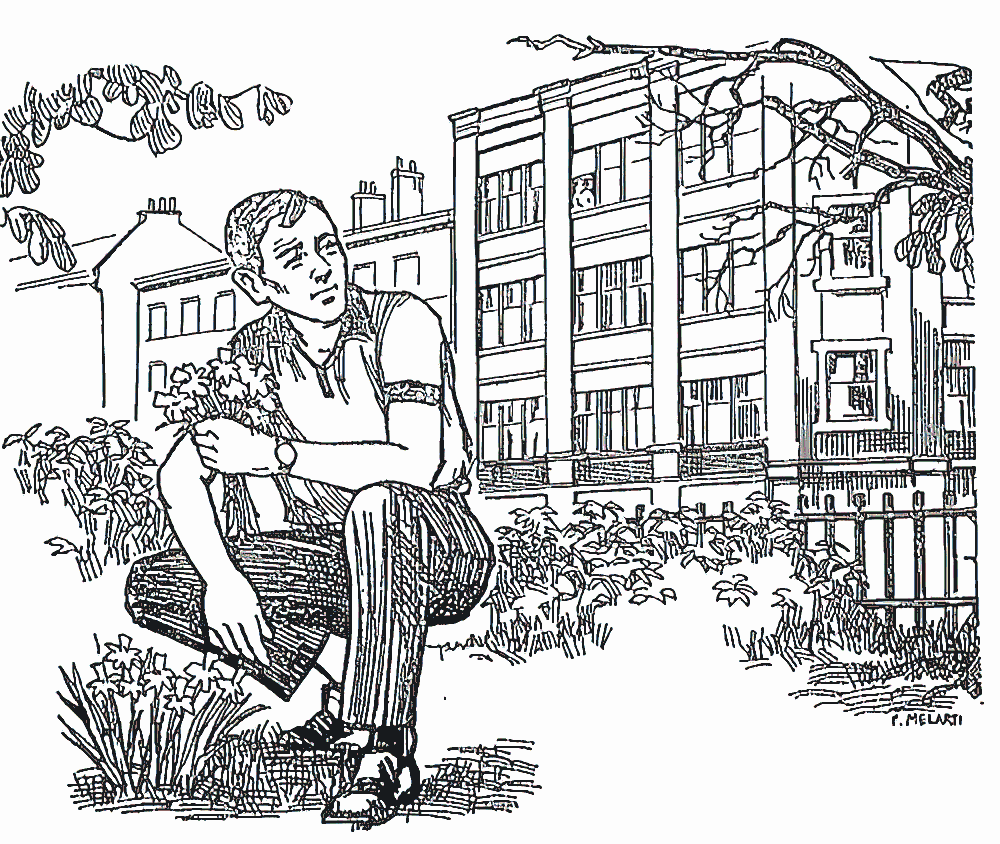
Difficulty with a Bouquet

Seal, walking through his garden, said suddenly to himself, “I would like to pick some flowers and take them to Miss D.”
The afternoon was light and warm. Tall chestnuts fanned themselves in a pleasant breeze. Among the hollyhocks there was a good humming as the bees tumbled from flower to flower. Seal wore an open shirt. He felt fresh and fine, with the air swimming coolly under his shirt and around his ribs. The summer's afternoon was free. Nothing pressed him. It was a time when some simple, disinterested impulse might well flourish.
Seal felt a great, joy in the flowers around him and from this a brilliant longing to give. He wished to give quite inside himself, uncritically, without thinking for a moment: “Here am I, Seal, wishing something.” Seal merely wanted to give some of his flowers to a fellow being. It had happened that Miss D. was the first person to come to mind. He was in no way attached to Miss D. He knew her slightly, as a plain, elderly girl of about twenty who had come to live in the flats opposite his garden. If Seal had ever thought about Miss D. at all, it was because he disliked the way she walked. She walked stiffly, sailing with her long body while her little legs raced to catch up with it. But he was not thinking of this now. Just by chance he had glimpsed the block of flats as he had stooped to pick a flower. The flats had presented the image of Miss D. to his mind.
Seal chose common, ordinary flowers. As the stems broke he whistled between his teeth. He had chosen these ordinary flowers because they were the nearest to hand; in the second place, because they were fresh and full of life. They were neither rare nor costly. They were pleasant, fresh, unassuming flowers.
With the flowers in his hand, Seal walked contentedly from his garden and set foot on the asphalt pavement that led to the block of flats across the way. But as his foot touched the asphalt, as the sly glare of an old man fixed his eye for the moment of its passing, as the traffic asserted itself, certain misgivings began to freeze his impromptu joy. “Good heavens,” he suddenly thought, “what am I doing?” He stepped outside himself and saw Seal carrying a bunch of cheap flowers to Miss D. in the flats across the way.
“These are cheap flowers,” he thought. “This is a sudden gift. I shall smile as I hand them to her. We shall both know that there is no ulterior reason for the gift and thus the whole action will smack of goodness — of goodness and simple brotherhood. And somehow... for that reason this gesture of mine will appear to be the most calculated pose of all. Such a simple gesture is improbable. The improbable is to be suspected. My gift will certainly be regarded as an affectation.
“Oh, if only I had some reason — aggrandisement, financial gain, seduction — any of the accepted motives that would return my flowers to social favour. But no — I have none of these in me. I only wish to give and to receive nothing in return.”
As he walked on, Seal could see himself bowing and smiling. He saw himself smile too broadly as he apologised by exaggeration for his good action. His neck flinched with disgust as he saw himself assume the old bravados. He could see the mocking smile of recognition on the face of Miss D.
Seal dropped the flowers into the gutter and walked slowly back to his garden.
From her window high up in the concrete flats, Miss D. watched Seal drop the flowers. How fresh they looked! How they would have livened her barren room!
“Wouldn't it have been nice,” thought Miss D., “if that Mr. Seal had been bringing me that pretty bouquet of flowers! Wouldn't it have been nice if he had picked them in his own garden and — well, just brought them along, quite casually, and made me a present of the delightful afternoon.” Miss D. dreamed on for a few minutes.
Then she frowned, rose, straightened her suspender belt, hurried into the kitchen.
“Thank God he didn't,” she sighed to herself. “I should have been most embarrassed. It's not as if he wanted me. It would have been just too maudlin for words.”
EXPLANATORY NOTES
1. too (something) for words
So extremely (something) that it cannot be described in words.
Marie, you are too kind for words. How can I ever thank you?
1. too (something) for words
So extremely (something) that it cannot be described in words.
Marie, you are too kind for words. How can I ever thank you?